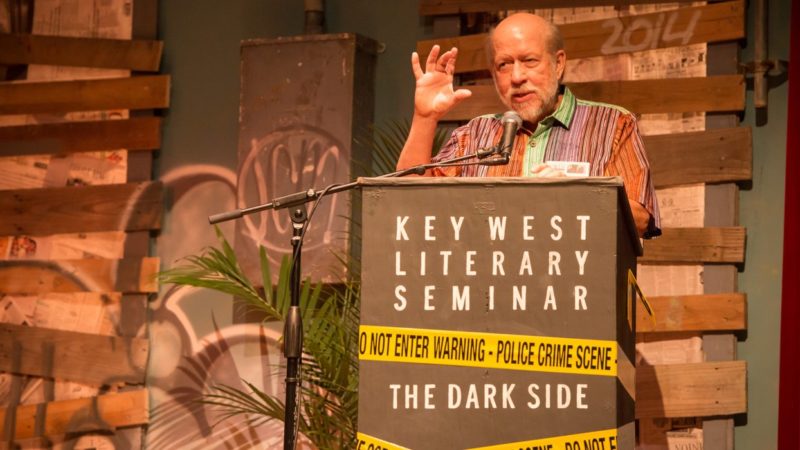William Kent Krueger
Location-Minnesota
Raised in the Cascade Mountains of Oregon, William Kent Krueger briefly attended Stanford University—before being kicked out for radical activities. After that, he logged timber, worked construction, tried his hand at freelance journalism, and eventually ended up researching child development at the University of Minnesota. He currently makes his living as a full-time author. He’s been married for over 40 years to a marvelous woman who is an attorney. He makes his home in St. Paul, a city he dearly loves.
Krueger writes a mystery series set in the north woods of Minnesota. His protagonist is Cork O’Connor, the former sheriff of Tamarack County and a man of mixed heritage—part Irish and part Ojibwe. His work has received a number of awards, including the Minnesota Book Award, the Loft-McKnight Fiction Award, the Anthony Award, the Barry Award, the Dilys Award, and the Friends of American Writers Prize. His last five novels were all New York Times bestsellers.
“Ordinary Grace,” his stand-alone novel published in 2013, received the Edgar Award, given by the Mystery Writers of America in recognition for the best novel published in that year. “Windigo Island,” number fourteen in his Cork O’Connor series, was released in August 2014. (Goodreads)
His novel This Tender Land is a Roaming the Arts favorite of 2020.
His Cork O’Connor series continued in 2022 with Fox Creek and his latest stand-alone in 2023, The River We Remember.

You Might also like
-
Andre Dubus III
Andre Dubus III is the author of seven books: The Cage Keeper and Other Stories, Bluesman, and the New York Times bestsellers, House of Sand and Fog, The Garden of Last Days, Gone So Long and his memoir, Townie, a #4 New York Times bestseller and a New York Times “Editors Choice”.
Gone So Long, is a masterpiece of thrilling tension and heartrending empathy. Few writers can enter their characters so completely or evoke their lives as viscerally as Andre Dubus III. In this deeply compelling novel, a father, estranged for the worst of reasons, is driven to seek out the daughter he has not seen in decades.
Recently published, Such Kindness, is the story of people whose stories are rarely told. The novel charts a remarkable rebirth, not from poverty to wealth but from bitter helplessness to the knowledge of self worth. The result is a gripping and transformational journey towards kindness. The result is also a tremendously moving novel.” – Ann Patchett
 Post Views: 2,802
Post Views: 2,802 -
Book Club Reads – 20 for 20
Book Club Reads – 20 for 20
Culled from the favorites of three east coast book clubs.
Please write with your book club favorites – info@roamingthearts.com
It is time to compile a 2021 list. Tell us what you loved. #bookclub
American Dirt- Jeannine Cummins Apeirogon-Colum McCann Ask Again, Yes –Mary Beth Keane Behold The Dreamers –Imbolo Mbue Bel Canto –Ann Patchett Born A Crime- Trevor Noah Eleanor Oliphant is Completely Fine – Gail Honeyman Fates and Furfies – Lauren Groff In The Midst of Winter – Isabel Allende Mrs. Hemingway – Naomi Wood Pachinko –Min Jin Lee Tattooist Artist of Auschwitz – Heather Morris The Extraordinary life of Sam Hell- Robert Dugoni The Great Alone – Kristin Hannah The Great Believers –Rebecca Makkai The Inn At Lake Devine –Elinor Lipman The Man with a Load of Mischief –Martha Grimes The Snow Child – Eowyn Ivey The Storyteller’s Secret – Sejal Badani This Tender Land-William Kent Krueger Post Views: 2,383 -
James W. Hall
Location: (Thorn series) Florida Keys
James W. Hall
Always excited about a new Thorn story…
Sixteen of his novels feature a hardcore loner named Thorn, who makes a meager living tying bonefish flies. Thorn, and his private eye pal, Sugarman, have teamed up to thwart animal smugglers, cruise ship hijackers, rogue medical experimenters, and other assorted villains. For a man who simply wants to be left alone to contemplate the island light and sweet sea breezes of Key Largo, Thorn has been drawn into a long string of adventures to right wrongs and avenge the deaths of his friends, relatives and lovers and has taken innumerable gashes and wounds and scars in the process.
Hall’s non-fiction work includes Hot Damn! a collection of personal essays he wrote for the Ft. Lauderdale Sun-Sentinel’s Sunshine Magazine, as well as some he wrote for the Washington Post and The Miami Herald.
His second non-fiction effort is Hit Lit (Random House) an analysis of twelve of the most commercially successful novels of the last century and the dozen features those books have in common.
 Post Views: 2,364
Post Views: 2,364



